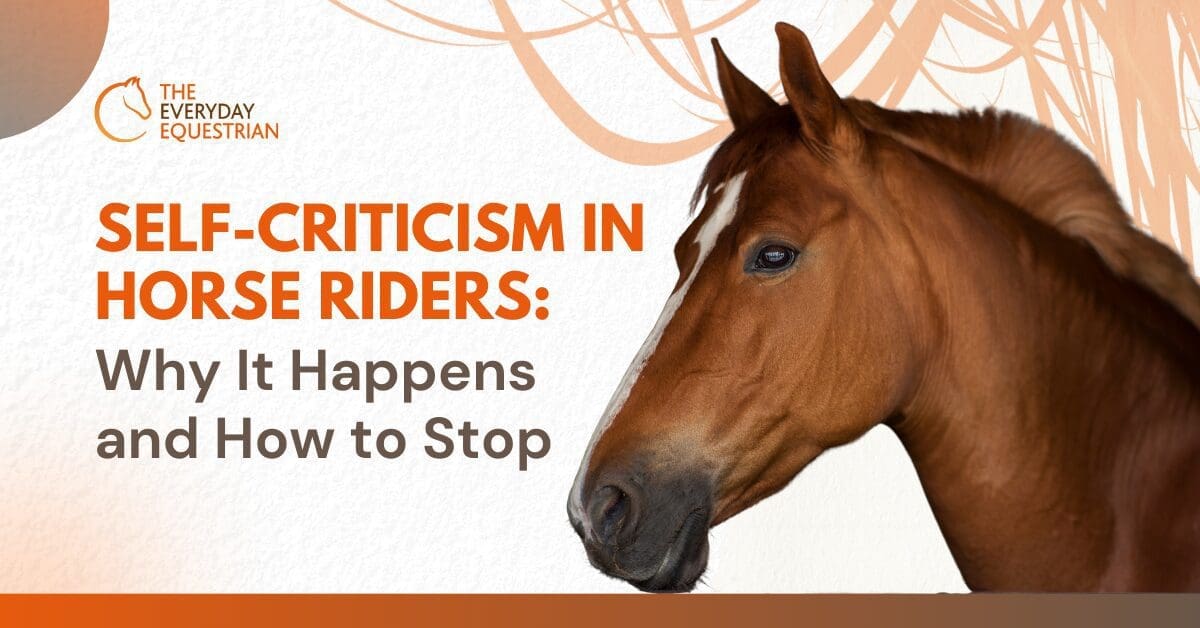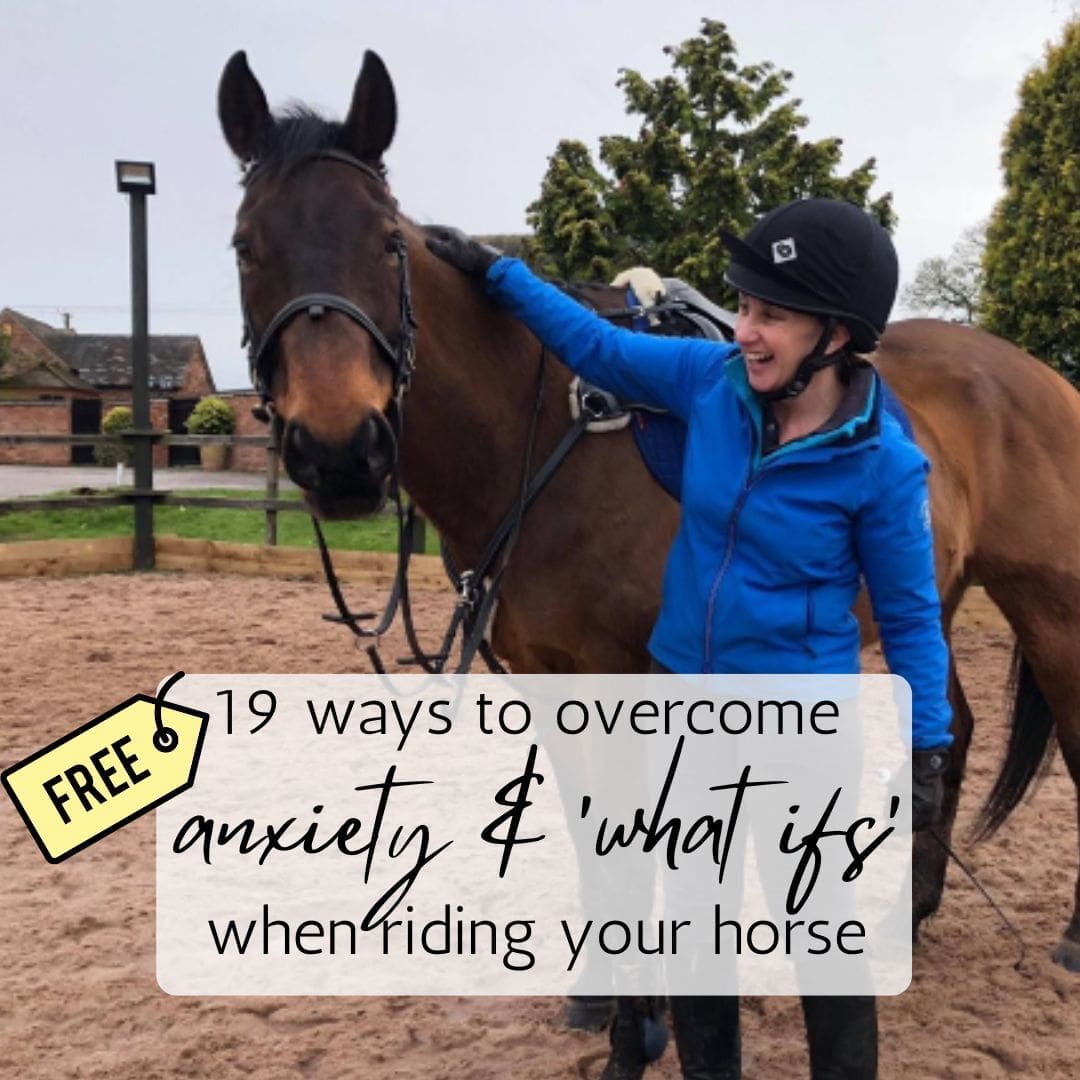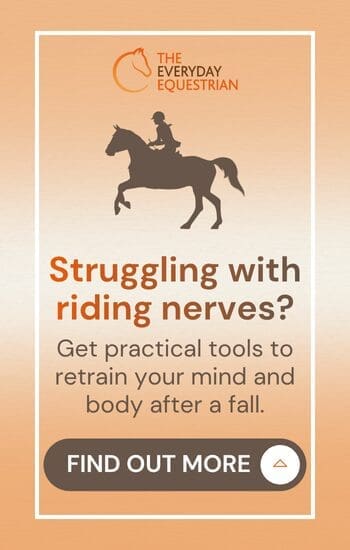Have you ever walked away from a ride feeling like you got everything wrong? Maybe your horse spooked, your transitions were messy, or you just didn’t ride how you’d hoped. And instead of shrugging it off, you found yourself replaying the ride over and over in your head, picking apart every moment and criticising yourself harshly.
If that sounds familiar, you’re not the only one.
Self-criticism is incredibly common among horse riders. We’re a tough bunch, right? Whether you’re schooling at home, out hacking, or preparing for a competition, that inner voice can feel relentless. It whispers (or shouts) that you’re not good enough, you’re letting your horse down, or you should be doing better by now.
In this article, we’re going to take a closer look at what self-criticism actually is, why it shows up, how it affects your confidence and riding, and what you can do to begin shifting that inner voice. Because here’s the good news — with the right approach, it is possible to ride with more calm, confidence and clarity. And it starts by changing the way you speak to yourself.
What is self-criticism?
Self-criticism is the habit of judging yourself harshly. It’s that internal voice that points out your mistakes, downplays your progress, and holds you to often impossible standards. For horse riders, this voice might say things like, “I always mess this up,” “I’m not a good enough rider,” or “My horse would be better off with someone else.”
Sometimes it kicks in straight after a ride, and sometimes it shows up before you’ve even put your foot in the stirrup.
It’s essential to understand the difference between helpful self-reflection and harmful self-criticism. Reflection is useful — it allows you to learn, adapt and grow. But criticism that leaves you feeling ashamed, anxious or stuck doesn’t help you improve. In fact, it does the opposite.
Many riders believe that being hard on themselves keeps them striving to improve. But the truth is, riders who practise self-compassion tend to be more resilient and more focused and actually make more progress in the long run. The goal isn’t to ignore mistakes — it’s to learn from them without beating yourself up.
What causes self-criticism in riders?
Self-criticism doesn’t just appear out of nowhere. It’s often shaped by your past experiences, environment, and the pressure you put on yourself. Here are a few common reasons why self-criticism shows up so strongly in horse riders.
Pressure to perform
Many riders feel they have something to prove — to their instructor, their peers, or even themselves. Whether it’s a lesson, a hack, or a competition, that internal pressure can make every mistake feel like a big deal.
Perfectionism
If you’re someone who deeply cares about your horse and wants to get things right, it’s easy to fall into perfectionist thinking. You might believe that every ride has to go perfectly, and if it doesn’t, it feels like a failure — even when progress is being made.
Comparison to others
Social media, yard chat, and other riders’ progress can be a big trigger. It’s easy to compare your current struggles with someone else’s highlight reel and come away feeling not good enough.
Fear of letting your horse down
Many riders carry a deep sense of responsibility for their horses’ well-being and progress. When something goes wrong, you might blame yourself entirely, even when it’s not your fault or out of your control.
Past experiences
If you’ve had a coach, teacher or even a friend who was highly critical or made you feel small, those messages can stick. Over time, you begin to internalise them, and they become your inner voice.
If you’ve ever found yourself asking, “Why do I always criticise myself when I ride?” or “How do I stop being so negative in the saddle?” — these are the patterns worth exploring.
How self-criticism affects horse riders
Self-criticism doesn’t just live in your thoughts — it spills over into how you ride, how you feel, and how your horse responds.
It knocks your confidence.
If you constantly tell yourself you’re not good enough, it’s hard to feel calm or capable in the saddle. You might start hesitating, overthinking, or second-guessing everything you do. Over time, this can chip away at your self-belief and make riding feel more stressful than enjoyable.
It interferes with your performance.
Riders stuck in a negative thinking loop often find themselves tense, distracted, and disconnected. You might be so focused on what went wrong yesterday that you can’t fully respond to what’s happening today.
It affects your horse
We know that horses are incredibly sensitive to our emotions. If you’re riding with tightness, self-doubt or frustration, your horse will often mirror that. This can create tension or misunderstandings, which feed back into your belief that you’re not riding well — even though it began with mindset, not ability.
It drains your joy
Above all, harsh self-criticism takes the enjoyment out of riding. When every ride becomes something to analyse or feel guilty about, it’s easy to lose the sense of connection and freedom that brought you to horses in the first place.
The different types of self-criticism
Not all self-critical thoughts sound the same. Here are some of the most common ways that the inner voice might show up:
The Perfectionist
“If it’s not perfect, it’s a failure.”
This rider sets impossibly high standards and focuses only on what went wrong, no matter how much went right.
The Comparer
“She rides so much better than me.”
This rider constantly compares themselves to others, measuring their progress against someone else’s journey.
The Blamer
“It’s all my fault.”
This rider takes on full responsibility for every issue, even when it’s outside their control.
The Overthinker
“Why did I do that? What if I made things worse?”
This rider gets stuck replaying every mistake and struggles to move on mentally after a challenging ride.
Recognising your own self-critical pattern is the first step to changing it. Which one sounds most like you?
The psychology behind self-criticism in riders
There’s a reason your brain leans into self-criticism, and understanding the psychology behind it can help you respond with more compassion and clarity.
The Inner Critic
This voice often forms from past experiences — a teacher who was quick to point out faults or environments where you felt you were never quite good enough. Over time, this voice becomes internalised and speaks up whenever you feel vulnerable or under pressure.
Limiting Beliefs
Many riders hold deep beliefs like “I’m not capable” or “I’m not safe.” When a ride doesn’t go to plan, it feels like evidence that these beliefs are true — and the inner critic uses that to reinforce its message.
Fight, flight or freeze
When you’re anxious or under pressure, your nervous system kicks into survival mode. In this state, it’s much harder to think clearly or ride instinctively. Your brain scans for threats and mistakes, and the inner critic gets louder.
Self-sabotage
Sometimes, self-criticism is actually a defence mechanism. If you convince yourself you’re not good enough, you don’t have to risk failing or being judged. But this mindset keeps you small and stuck rather than helping you grow.
These patterns are common — and they’re not fixed. With the right tools, you can start to change them.
Start overcoming self-criticism
You don’t have to tackle everything at once. In fact, the most effective changes often start small. If you try just one thing, let it be this:
Catch the critic and change the tone.
Self-critical thoughts often happen automatically. You might not even notice them until you feel your confidence drop. The first step is to start noticing the thought — pause, and ask yourself:
- Is this helpful?
- Would I speak to a friend this way?
- What’s a kinder, more realistic way to look at this?
Example:
“I’m a rubbish rider” → becomes → “That ride didn’t go to plan, but I stayed calm and kept trying. That matters.”
It’s not about being blindly positive. It’s about creating space for more balanced thinking, where progress and effort count as much as the outcome. With practice, this new tone becomes your default, and your confidence builds from the inside out.
You can change the way you speak to yourself.
The way you talk to yourself shapes how you feel, how you ride, and how you connect with your horse. If your inner critic has been in the driver’s seat for too long, it’s time to take the reins back.
You don’t need to wait until you feel more confident to speak to yourself with kindness. You can start right now, and that choice alone will begin to shift your experience in the saddle.
Want to dive deeper into this work?
The Rider’s Guide to Managing Your Inner Voice is a practical digital guide to help you understand, manage and change the way you speak to yourself. It’s packed with simple mindset techniques, journaling prompts and supportive tools based on rider psychology.
This is for you if:
- You’re tired of overthinking after every ride
- You want to feel more confident and calm with your horse
- You’re ready to change the way you show up in the saddle — from the inside out
Get your copy today and start quieting your inner critic with confidence. Click here to get the guide.
You deserve to enjoy your time in the saddle — and that begins with how you speak to yourself.



